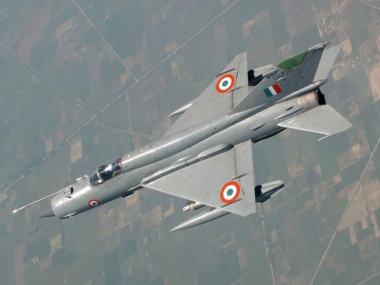New Delhi: “The springs installed in fuel pump aggregates of R-25 aeroengines are failing frequently. MiG 21 Bison aircraft accident, which occurred in November 2012 has been attributed to failure of springs due to surface corrosion. Out of the five Main Fuel Pumps fitted with Hindustan Aeronautics Limited manufactured springs, spring failures were found on three Main Fuel Pumps, which is a cause for serious concern. These spring failures would have resulted in aircraft accidents, which besides resulting in loss of costly aircraft would have also resulted in irreplaceable loss of human life,” reveals a UPA era report lying with defence ministry and exclusively reviewed by Firstpost. [caption id=“attachment_6171401” align=“alignleft” width=“380”]  Representational image. News18[/caption] This and some other shocking findings in the report has been buried by the bureaucrats despite the clamour for modernisation of the Indian Air Force when AK Antony was at the helm of affairs in the defence ministry. In the recent aerial dogfight with Pakistan, IAF pilot Wing Commander Abhinandan Varthaman scored a kill which was followed by intense debate among defence experts applauding the performance of an old Soviet fighter jet shooting down the modern US-made F-16 jet. However, some veterans blamed politicians and babus for degrading firepower of the air force over the years and cautioned that modern-day wars require advanced technology and it was the right time to replace the vintage fighter jets. This 2013 confidential quality audit report of the IAF clearly indicts the decision makers in the UPA and previous governments including NDA 1 headed by Atal Bihari Vajpayee. It further shows how the air warrior’s capabilities were grossly undermined. Why UPA in its 10 years of rule did nothing for ‘outdated jets’? The report further said: “There have been high failures of Main Fuel Pumps since 1990s, due to fuel leak from pump drive end. Throttle lever and centrifugal governor end of Main Fuel Pump of R-25/R-25 U aeroengines. To combat the fuel leak, various studies were undertaken in 1997, 2005 and 2007 and their recommendations were implemented. In spite of incorporating changes, fuel leak from Main Fuel Pumps continued unabated from throttle end.” The MiG 21 has often been termed as “flying coffin” and the confidential report clearly answers the ‘why’ lingering on the mind. The successive regime has been careful in their statement regarding MiG accidents to justify the status quo. On 27 December 2017, Minister of State for Defence Subhash Bhamre told Parliament that 10 MiG aircraft crashed between 2014-17 and 10 squadrons of IAF equipped with MiG-21 and MIG-27 aircraft are scheduled to retire by 2024 on completion of their total technical life. On 26 December 2018, Defence Minister Nirmala Sitharaman said two MiG aircraft in the last six months (July-December 2018) and there was one casualty of service personnel in these accidents. She further said: “A continuous and multi-faceted effort is always underway in the IAF to enhance and upgrade flight safety. Measures to enhance the quality of training to improve the skill levels, ability to exercise sound judgment and situational awareness of pilots are being pursued. Constant interaction with Original Equipment Manufacturers (OEMs) is also maintained for enhancement of aerospace safety.” According to March 2018 report of Parliamentary Standing Committee on Defence 12 February 2013 MiG 27, 19 February Sukhoi and 7 June 2013 accident of MiG 21 Bison was due to technical defect. On 27 May 2014 another MiG 21 went down due to technical defects. The representatives of the IAF told the committee that “there are possibilities of people making a mistake in maintenance.” The panel had slammed the government for the reduction in the IAF budget. The Parliamentary Committee said: “With the skinning of the budget under the capital segment, the Committee is compelled to point out that there appears to be a lack of sufficient sincerity towards capacity enhancement and modernization of the Air Force. Flight safety also becomes a matter of concern due to issues of obsolescence. In this context, the Committee further believes that inadequacy of budget allocation would result in deferment of certain procurements, thereby, deepening the capability deficit further.”
The 2013 confidential quality audit report of the IAF clearly indicts the decision makers in the UPA and previous governments including NDA 1 headed by Atal Bihari Vajpayee.
Advertisement
End of Article


)

)
)
)
)
)
)
)
)



